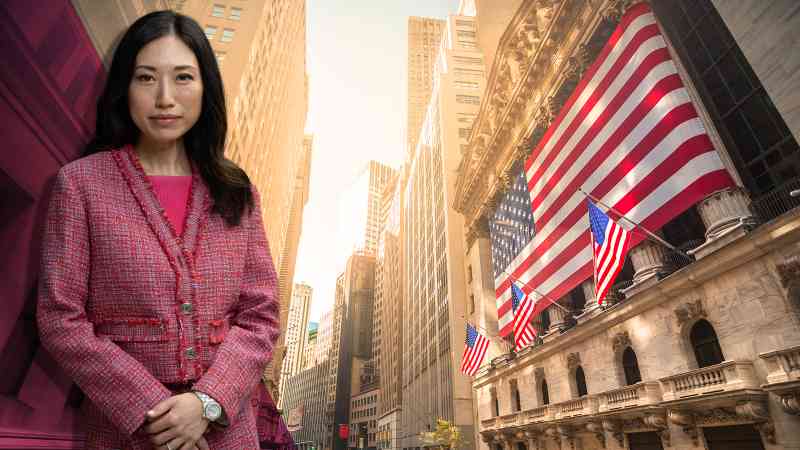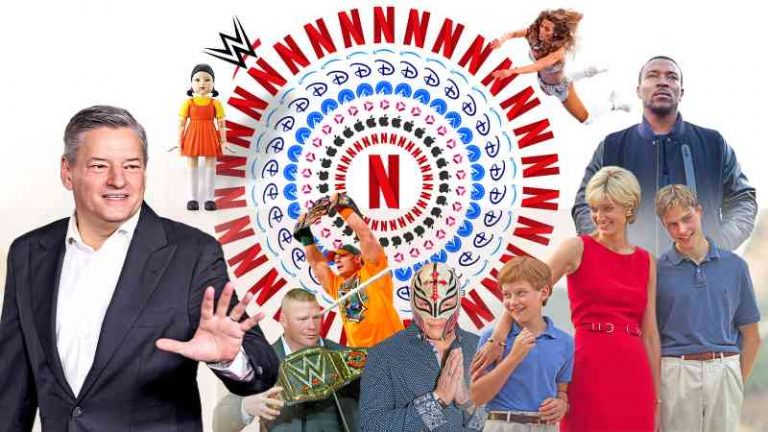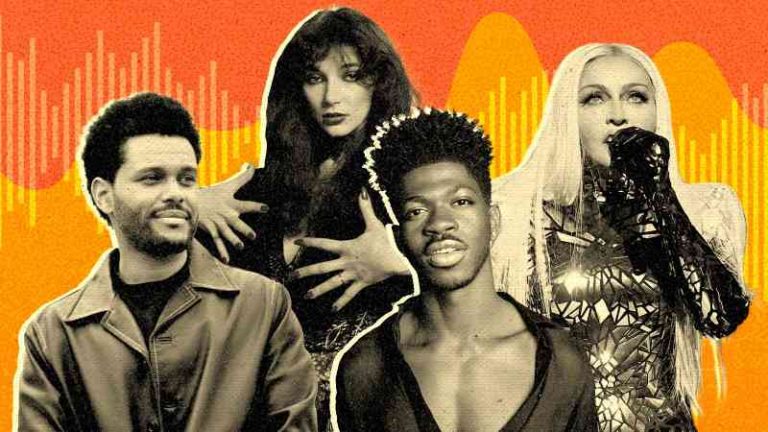The secrets of a hedge fund billionaire’s PA
In one of the richest and most powerful hedge funds in the world lurks a mysterious and glamorous woman. She loiters around the men’s luxurious bathrooms but doesn’t look like a cleaner. She wears high heels that make no sound on the expensive carpet. She moves discreetly. Her “full-time job”, says Carrie Sun, the author of a compelling memoir about super-rich elite financiers, is to flush the toilets after the men.
“So symbolic,” Sun says when we speak by video call. The astonishing problem was that the men, and they were all men, who made their money exploiting disasters in the real world were either too selfish or too busy — “There was that much time pressure,” she says — to clear up their own. Sun acknowledges her frustration that this woman had to be hired and that no one bothered to learn her name. This is the finance sector seen up close, at its crudest and most profound: “The rich not taking care of their own shit.”
On one level Sun’s memoir, Private Equity, does for finance what The Devil Wears Prada did for fashion. As it begins Sun is 29, the personal assistant to a founder of an investment firm in Manhattan. This man was “the first billionaire I would ever meet”. Sun herself was possibly also the most overqualified assistant he would ever meet: she had a degree in maths from MIT, went to the Wharton School of Business for an MBA, and had many years of experience as an investment manager at Fidelity Investments. She could perhaps have had his job in another life, but billionaires know they can get what they want. She was on nearly $300,000, plus bonuses, plus $5,000 department store vouchers he could scatter towards her like tips out of his loose change. “Remember,” he says to Sun, “money can solve nearly everything.”
Her memoir, then, has some of that democratic deliciousness, an exploitative boss exposed by his most intimate and trusted aide. Anyone who watched Meryl Streep playing a version of the Vogue editor Anna Wintour making imperious demands in The Devil Wears Prada will find some crossover here. Sun’s job was to make the impossible happen. She had to ghost-write inspirational speeches at the last minute; organise fairgrounds in Central Park for corporate “family days” that will remain empty because no analyst has the time to be with his family; distil self-help books for his endless “personal growth”; and prep her boss with information that should be private by utilising all legal means available — the latter a useful skill in a writer.
But the central insight runs deeper than that. Sun was a committed capitalist. Her parents fled to America from a communist China where “my dad was hungry much of his life”, she tells me. Her parents “ate bitterness”. As a result, when Sun was a child she wanted nothing but financial stability. She illustrated her first babyish attempt at a book with herself in a business suit: “CEO Sun”. She wrote a story in which money literally grew on trees. To her, like so many, finance was “an industry built on the American dream: you can be anyone as long as you can make the right calls. The industry thinks of itself as among the most meritocratic.”
However, her time spent deeply embedded with the private jet set challenged everything. This wasn’t democracy in operation, it was the opposite: power being concentrated among the shadowy super-rich, gobbling up large swathes of the companies that rule our lives and with less and less accountability. Private Equity is a thoughtful meditation on what happens when rampant self-interest is left unchecked.
● Why private equity is back — and which companies are on the hit list
She is now 39, married to a composer and living in New Jersey, living an artistic life completely alien to her decade on Wall Street. Who, I ask her, is the more ruthless, the writer or the investment banker?
“The honest answer is both,” she says, deep-voiced, articulate. “No characters in this book are made-up or composite. It is entirely true apart from some details changed to preserve confidentiality and privacy. I struggled a lot with the sense of betrayal … A writer has to be ruthless for the truth. An investment manager is ruthless for profits. In my world view, truth is more valuable than profits.”
The people Sun worked for were not obvious villains. They disdained the typical amoral “fat cat” bosses of the 20th century, immortalised in films such as Wall Street and books like Liar’s Poker. Instead, they believed themselves the 21st-century ideal of benign dictators, superior to everyone according to superhuman Nietzschean ideals: smarter, stronger, bettering humanity while buying a yacht. Among similar we can count the high-profile tech bros Elon Musk and Mark Zuckerberg. She says her boss, whom she anonymises as Boone, would never cheat on his wife — “so inefficient” — but that he, like her company, which she calls “Carbon”, was private to the point of paranoia.
I’m amazed it was possible to write this book at all, I say. Sun explains that after her 14 interviews to get the job, she signed some confidentiality agreements when she began work for Carbon.
“My publishers, and I also work with a lawyer, feel I am able to publish this book and tell my story of the working conditions.” She does not know the reaction of her former boss or the company, saying: “I’ve heard nothing from them.”
At first, the trappings of wealth were seductive. Sun writes with wit about her induction to the firm, a tour of the gym with its floor-to-ceiling windows onto Central Park, racks of fresh designer workout gear just waiting to be taken from the hanger, and the vast platters of food from the most expensive restaurants that are slopped into the bin at the end of the day. His food preferences are, in his briefing note, “protein — not heavy. Salad/soup. Clean. Not mayo. No caffeine/red wine. Anti-cancer.” She is given an employee handbook noting that “individuals should refrain from using vulgarities, obscenities, jokes, sarcasm”. Next she is awarded “the sable fur of the investor class, a Patagonia fleece jacket with another Carbon logo embroidered on the left arm”. She got Boone into meetings with other billionaires or, as she puts it, she became the “UPS guy whose packages were rich white men”.

Boone heavily invests in companies promoting 21st-century convenience tech. These offer the dream of more leisure through more efficiency. In fact, they do the opposite: more efficiency breeds more work, and tech enables the bleed of work into personal life that has accelerated modern stress and isolation for so many of us. Sun lived this up close. When she is hired Boone wonders aloud what she will do with her free time outside her working hours of nine to six. Yet this is the very appeal of her taking this demotion, to give her time to work on her writing.
“I believed in the possibility of good billionaires,” she writes. “Believing in him meant I didn’t have to change my world view.”
In reality, on her second day she is presented with a list of 96 of his demands on her time, which she is to give unstintingly. That morning she is called to a “sit” (“which means a meeting”) with Boone in which she is admonished that she did not instantly reply to an email he sent the night before. She works “11 hours a day” at the office and never leaves before Boone, unless she is injured.
And she does once get injured. While running on the treadmill, she realises an email has arrived from him. Wrestling between getting a few minutes of personal time and jumping to his tune, she attempts to look at her phone while running on the gym’s hamster wheel — a metaphor for 21st-century office life if ever I heard one. She flies off and her designer leggings don’t protect her knees from deep wounds. She gets an Uber home and an Uber back to the office the next morning. “No more personal goals,” she reminds herself.
“I might not be working all day Saturday or Sunday, but I might receive an email or a text that means I have to instantly change my plans for the day. It wasn’t just the number of hours I worked, it was the quality of the hours off.”
● Confessions of a banker: office porn, drug binges, £25,000 bar bills
In two years she lost touch with her friends, broke up with boyfriends and developed an eating disorder as she ordered more sweet snacks to cope with the stress. He offers her diet tips: when she does a juice cleanse for a week, he tells her to extend it for two. He owned you, didn’t he?
“Yes.”
She is not looking for sympathy; she was well paid and there by choice.
“But the inequities that I felt at work are very universal,” she says. “Symbolic, not just in finance, but all over the world.”
Our lives are ever more owned by our bosses, our privacy ever more invaded by work or tech.
It takes longer for her to develop cynicism about the “goodness” of Boone. “I believe he believed it,” she says. Financiers like to say “earn a lot now, give a lot later”. This way they can offset any guilt at their lavish lifestyles. In a particularly televisual moment, Sun has the job of transporting an obscene amount of cash via taxi, which gets held up and surrounded on Wall Street by anti-capitalist protests. While Sun is charged with addressing the philanthropic side of the business, she has an epiphany. Their work is a vicious circle. The business served to widen inequality, concentrating wealth. The effect was hardly offset by donations to charities and museums, with its favourable tax breaks.
“It was like I was frosting over the fundamental truth of what they were doing: actually widening inequality every day,” she says. “I began to question: if you’re making it worse when you’re making your billions, the philanthropy won’t be able to make it up on the back end.
“Also, their philanthropy was still a way for them to control the decision-making: they get to choose the world they want to bring about and the problems that their philanthropy wants to fix. I didn’t see any billionaires, when I was working there, giving their money towards solving major systemic issues that would eat away at their ability to make their billions. It was self-serving. It goes back to self-interest.”
● How to stay young like a billionaire
The public fascination with wealth, which she freely admits she shared, shows up in cultural life with the popularity of shows such as Succession or White Lotus.
“There’s a deep curiosity: who are these people? There’s so little information flowing out, when in fact these firms and these billionaires have a lot more influence and power than maybe people even realise,” she says. “There’s also a sense in which many people with extreme wealth often are able to get away with a lot, including criminal things. I think sometimes people look to those fictional ‘eat the rich’ satires like Succession for a sense of cosmic justice. There is something satisfying about seeing the rich get what they deserve.”
That rarely happens in real life. How does she feel about Boone now? Does she feel he exploited her? She pauses.
“I think he did exploit me, but never intentionally,” she says carefully. He saw “burnout” as a badge of honour, “never mind that his burnout enriches himself and that he gets to be a billionaire, whereas my burnout further enriches him.”
In the end she quit. She realised she too had forgotten the name of the woman whose only job is to flush away the men’s toxic waste, and nobody else in the firm knows.Private Equity by Carrie Sun (Bloomsbury £20). Buy from timesbookshop.co.uk Special discount available for Times+ members






